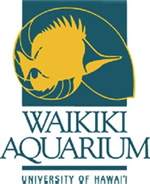Waikiki Get Down - Honolulu, Hawaii
Event Calendar ItemFamily Fun At The Waikiki Aquarium - FEBRUARY 2018 Events And Programs
- Tweet
- Type: Family

Date: FEBRUARY 2018 Events
Time: see notes
Location:
2777 Kalakaua Avenue
Honolulu, HI 96815
Phone: 808-923-9741
View Map
Cost: see notes
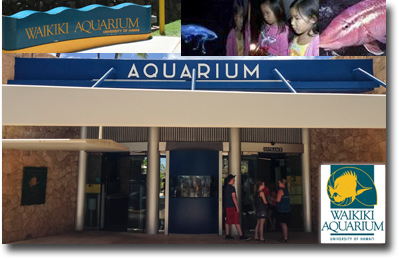
Waikiki Aquarium Family Programs
FEATURED EXHIBIT/ - Amazing Adaptations Exhibit Opens!
Description: Be among the first to see a NEW gallery featuring seahorses, seadragons and pipefishes and learn about their incredible adaptations. Keiki crafts that give more insight in to these amazing creatures will be available from 9AM - 1PM !
Back to the top FEBRYARY 2018 SPECIAL EVENTS/OPPORTUNITIES
11th Annual Koi Show
Sunday, February 18, 2018 @ 9:00 am - 2:00 pm
Waikiki Aquarium, 2777 Kalakaua Ave, Honolulu, HI 96815, USA
The Waikīkī Aquarium will host Hawaii's largest koi show, featuring hundreds of top-quality koi for exhibit and display. In addition, koi experts will lead educational seminars and guests can enjoy a variety of authentic Japanese performances and keiki activities. Nishikigoi (brocaded carp), more commonly referred to simply as ‘koi,' originated in Niigata Prefecture, Japan, more than 200 years ago and have since spread around the world.
Admission is $12 for non-members; $8 for Kama'aina and military with ID; $5 for senior citizens and juniors ages four to 12 and free for children three and under and Friends of the Waikīkī Aquarium (FOWA).
Get a two day pass for the discounted price of $18 when you buy online
Marine Alien Species in Hawai‘i: An Overview and Preventing the Introduction and Transfer of Aquatic Alien Species in Hawaiʻi
Tuesday, February 27, 2018 @ 3:30 pm - 4:30 pm
Waikiki Aquarium, 2777 Kalakaua Ave, Honolulu, HI 96815, USA
Join us for this two part seminar by Scott Godwin a biologist with DLNR-DAR and Julie Kuo the Hawaii Ballast Water & Hull Fouling Coordinator during Invasive Species Awarness Week.
Tuesday, February 27th, 2018
3:30pm-4:30pm in the Waikiki Aquarium Classroom
Marine Alien Species in Hawai‘i: An Overview presented by Scott Godwin
The topic of marine alien species is not as familiar to the public as issues for terrestrial systems in Hawai‘i. There has been a great deal of work focusing on the baseline data for alien species in the marine environment and these efforts are proving to support management actions throughout the archipelago. Beginning in the late 1990's efforts were begun to determine what alien species are present, what where their transport vectors and then use this information to inform the scientific and resource management community. These baseline efforts showed the importance of non-traditional vectors associated with maritime commerce, such as vessel biofouling and marine debris, as opposed to a primary focus on ballast water. Continued efforts have shed light on the effects of these vectors on the remote Northwestern Hawaiian Islands and how natural disasters, such as the 2011 Japan Tsunami, can have potential impacts on our archipelago. An overview of baseline research that has led to the development of management actions and policies will be presented.
Preventing the introduction and transfer of aquatic alien species in Hawaiʻi presented by Julie Kuo
Aquatic invasive species have been known to carry potential environmental and socioeconomic implications like the cholera epidemic in South America that affected human health and invasive algae in Kaneohe Bay that affected many coral habitats. Currently, the Hawaiian Archipelago possesses nearly the equivalent number of established aquatic alien species as compared to all the states combined in the Continental US--approximately 400 (Hawaii) vs. 450 (Continental US) aquatic alien species. A recent study has indicated that the top two vectors of aquatic alien algae and invertebrate introductions into the State are associated with unmanaged ballast water discharge and vessel biofouling. This talk will summarize the proactive measures that DLNR is taking to minimize new aquatic alien introductions into the State as well as the transfer among neighboring islands.
ONGONG EVENTS
Afternoons at the Aquarium
Looking for something to do after school? Every Wednesday, the Aquarium hosts an interactive learning activity near the Monk Seal Deck. Join us for a critter encounter or a marine science craft designed for families. Free with admission to the Aquarium.
Wednesdays 3:00 pm-3:45 pm
February 7, 2018
February 14, 2018
February 21, 2018
February 28, 2018
Behind the Scenes
Learn what makes the Aquarium run, from fish food to quarantine, and many stops in between. Climb-up and peer into the backs of the exhibits and see how exhibits are created. Visit the coral farm where and the Jelly Hale, where sea jellies are raised. The program will end with participants feeding the animals in the Edge of the Reef exhibit. Minimum age 7 years; youngsters must be accompanied by an adult. Accessibility is limited. Groups of ten or less are welcome. $12/adult, $8/child ($15/$10 for non-members).
Thursdays 3:00pm -- 4:15pm
February 8, 2018
February 15, 2018
February 22, 2018
Hawaiian Reef Animals
Search for night‐active crabs, lobsters, eels and octopuses. Look for sleeping parrotfishes, triggerfishes and day octopus in their dens. For the adventurous, ages 6 years and up; youngsters must be accompanied by an adult. Participants should be comfortable in the ocean, both day and night. $20/ adult, $15/child and $15/$10 for members.
1:00pm -- 1:45pm
February 8, 2018
February 15, 2018
February 22, 2018
Aquarium's Top 5
What animals are the most interesting to guests? Learn a little about the longest lived giant clam in captivity, those weird and wonderful seahorses, the most endangered seal in the world, and fish unique to Waikīkī Aquarium. Drop in for this short presentation at noon on Wednesdays. Free with admission to the Aquarium.
12:00pm -- 12:30pm
February 5, 2018 February 7, 2018
February 12, 2018
February 14, 2018
February 21, 2018
February 26, 2018
February 28, 2018
Exploring the Reef at Night
Search for night-active crabs, lobsters, eels and octopuses. Look for sleeping parrotfishes, triggerfishes and day octopus in their dens. For the adventurous, ages 6 years and up; youngsters must be accompanied by an adult. Participants should be comfortable in the ocean, both day and night. $20/ adult, $15/child and $15/$10 for members.
Monday, February 27, 2018 @ 6:30 pm - 8:30 pm
Hawaiian Plant Guided Tour
Join Alice Roberts for a personal guided tour of the Aquarium's native Hawaiian plant gardens. A complete plant guide with 67 plants is also available in the Waikīkī Aquarium's Volunteer Office. You can print out your own Hawaiian Plant Guide map by going to this link: Click Here
First Thursday of the Month
.
February 1st, 2018 at 1:30 p.m.
March 1st, 2018 at 1:30 p.m.
April 5th, 2018 at 1:30 p.m.
OTHER EVENTS
Critter Encounters
Sneak-a-peek behind the scenes, and learn about Hawaiian reef animals. Hold a sea star, feel a sea cucumber and feed an anemone. This half-hour program is a great addition to any visit to Waikiki Aquarium. Perfect for families with children 4 and up. $5/person plus Aquarium Admission.
Mondays 9:30am -- 10:30am
TBA
Small Fry (aka Keiki Time)
Sharks, turtles, and seals are just some of the animals that will be highlighted in these classes for kids. Keiki will learn about sea creatures through crafts, singing, storytelling, dance and play. Designed for kids 1 to 4 years-old. $10/person, $6/member.
TBA
Exploring the Reef at Night
Search for night-active crabs, lobsters, eels and octopuses. Look for sleeping parrotfishes, triggerfishes and day octopus in their dens. For the adventurous, ages 6 years and up; youngsters must be accompanied by an adult. Participants should be comfortable in the ocean, both day and night. $20/ adult, $15/child and $15/$10 for members.
TBA
Aquarium After Dark
Discover if fish sleep on an after-dark flashlight tour of the Aquarium. Find the sleeping spot for the red-toothed triggerfish or the rock-mover wrasse. Are yellow tang always yellow? Come for a class followed by a tour of the exhibits. Minimum age 5 years: youngsters must be accompanied by an adult. $10/adult, $7/child ($14/10 for non-members). Pre-registration required.
TBA
Meet the Monk Seals!
More sightings of seals around the main Hawaiian Islands have renewed interest in these amazing and endangered animals. Learn about seals in the wild: What do they eat? How deep do they dive while hunting? Do they really have fingernails? Then move to the monk seal habitat where Aquarium Biologists will introduce you to the resident seals, Makaonaona and Ho'ailona. Participants will assist with seal enrichment activities. Designed for participants 6 and up, but anyone interested is invited to attend. Groups of 15 or less are welcome. $7/person ($10/person for non-members).
TBA
For additional information and to sign up...go to Eventbrite.com and search Waikiki Aquarium...or call the Volunteer Center at (808) 440-9021
LISTEN TO GREAT INTERVIEW
|
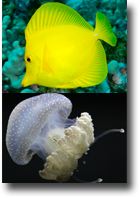
Founded in 1904 and administered by the University of Hawai'i at Manoa since 1919, the Waikiki Aquarium is located on the shoreline of Waikiki Beach next to a living reef and across from Kapiolani Park. The Aquarium -- second oldest in the U.S. -- showcases more than 500 marine species, and maintains more than 3,500 marine specimens. Public exhibits, education programs and research focus on the unique aquatic life of Hawai'i and the tropical Pacific.
The Aquarium welcomes more than 320,000 visitors annually, and is open daily from 9 a.m. to 4:30 p.m. except Honolulu Marathon Sunday and Christmas Day. Admission is $12 for visitors; $8 for local residents and active duty military with ID, $5 for senior citizens and juniors ages four to 12; and free for children three and under and Friends of Waikiki Aquarium (FOWA) members.

MISSION:
To inspire and promote understanding, appreciation and conservation of Pacific marine life.
DESCRIPTION:
Founded in 1904, the Waikiki Aquarium is the second oldest public aquarium in the United States. A part of the University of Hawai`i at Manoa since 1919, it is located next to a living reef on the Waikiki shoreline. Exhibits, programs, and research focus on the aquatic life of Hawai`i and the tropical Pacific, with roughly 320,000 people visiting the Aquarium each year. Over 3,500 organisms are on exhibit representing more than 500 species of aquatic animals and plants.
EXHIBITS:
Waikiki Aquarium exhibits focus on the diversity of aquatic, shoreline and coral reef habitats and living communities of Hawai`i and the tropical Pacific. Among the highlights:
- Corals Are Alive! interactive exhibits showcasing corals, their biology and conservation
- Sea Visions Theatre shows videos that illustrate shoreline conservation and how you can be a responsible reef visitor
- South Pacific Marine Communities features South Pacific habitats and species, including colorful reef corals and fishes,giant clams, groupers and snappers and intriguing partnerships such asanemone fishes and their host sea anemones
- Hawaiian Marine Communities recreates Hawaiian habitats from wave-swept surge zone to deep reef slopes, and from young to ancient reefs; celebrates distinctive reef life, including the longnose butterfly fish
- Ocean Drifters Gallery features a1,000-gallon moon jelly tank and a seasonally changing jelly wall that may contain white-spotted jellies, blue blubbers, sea nettles, box jellies and ctenophores
- Hunters on the Reef 35,000-gallon exhibits home to Hawaiian sharks and jacks; shark interpretive panels introduce shark biology, research, conservation and safety. New Spyball camera provides up close shark encounters in real time on a television screen
- Edge of the Reef naturalistic shoreline exhibit offering opportunities for supervised observation and hands-on interactions with selected marine life
- The Coral Farm exhibit and working research facility for propagation of reef corals
- Giant Clams exhibit and working research facility for propagation of clams
- Hawaiian Monk Seal Habitat features the endangered Hawaiian Monk Seal found only in the Hawaiian Islands
- Aquaculture features moi, a popular food fish, whose numbers have declined in the wild
- Coastal Gardens with native Hawaiian plants adapted for life close to the sea
ENDANGERED SPECIES:
Hawaiian monk seals; ‘öhai (endemic Hawaiian coastal plant)
UNIQUE SPECIES:
Pacific giant clams; Hawaiian stream gobies; raredeep-reef butterflyfish; bearded armorheads; masked angelfish; and diversenative coastal plants
CONSERVATION & RESEARCH:
The Waikiki Aquarium is a working research facility,conducting numerous conservation and research programs, including:
- Husbandry, nutrition and behavior of aquatic and marineaquarium specimens
- Husbandry and propagation of chamberednautilus
- Spawning behavior, larval rearing, and propagationpotential of selected reef fishes
- Identification & treatment of diseases, parasiteinfections and other ailments of aquarium marine life
- Coral husbandry, propagation and conservation
- Hawaiian monk seal metabolic and bacteriologicalresearch
- Giant clam husbandry and propagation
- Sea jelly husbandry and propagation
- Deep reef coral research
- Coral Ark: archiving and husbandry of rare Hawaiiancorare deep-reefrals
EDUCATION PROGRAMS:
The Waikiki Aquarium offers numerous education programs,including:
- Interpretive services: staff or volunteers enrich the visitor experience with explanations of the exhibits, demonstrations, and hands-on experiences
- Self-tour opportunities for individuals and groups: interpretive graphics & exhibits, handouts are available.
- School Program: presentations and docent-assisted tours for school groups, grades K - 6
- Outreach and special request presentations for schools and community groups
- Community Enrichment Program: year-round natural history field trips, classes, and workshops for children, families, and adults
- Information services: staff answer questions from visitors & community on marine and aquarium-science related topics
OPPORTUNITIES:
The Waikiki Aquarium affords a number of opportunities to get involved through:
- Membership: Join the Friends of the Waikïkï Aquarium (FOWA) to enjoy the annual benefits of free admission, 20% discount at the Natural Selections gift shop, quarterly mailings of our beautiful and informative magazine Kilo i'a, free salt water pick-up, and facility rental privileges at "Family" and "Family Plus" levels. To select the membership level right for you,please see the Visitor Services staff or contact Events and Membership Manager Raina Fujitani at (808) 440-9008 for more information.
- Volunteerism: When you donate your time and curiosity to the Waikiki Aquarium, you are rewarded with diverse and challenging opportunities to help make a difference!
- Education-- Docents provide on-site presentations and tours to elementary school groups and provide outreach programs for school and community groups. Interpreters at the Edge of the Reef exhibit assist visitors and provide up-close observations of Hawaiian marine life.
- Live Exhibits -- Assist with husbandry, tank maintenance and feeding.
- Natural Selection Shop -- Assist with stocking inventory and sales.
- Membership/PublicRelations/Special Events - Assist with bulk mail outs & communications with Aquarium members, public relations surveys, record-keeping and special events.
AWARDS:
The Waikiki Aquarium has received several awards for its research and conservation efforts, including:
- 2008 Keep It Hawai`i Award
- 2003 Munson Aquatic Conservation Exhibit (M.A.C.E.) Award from the American Zoo & Aquarium Association (AZA) for South Pacific Marine Communities exhibit
- 2003 Edward H. Bean Award from AZA for Long Term Tropical Pacific Coral Propagation Program
DIRECTOR: Dr. Andrew Rossiter
EMPLOYEES: 35 full-time, 36 part-time, 33 affiliate staff
HOURS: 9 a.m. to 4:30 p.m. daily (except Honolulu Marathon Sunday and Christmas Day)
ADMISSION: $12 for visitors; $8 for local residents and active duty military with ID, $5 for senior citizens and juniors ages four to 12; and free for children three and under and Friends of Waikiki Aquarium (FOWA) members.
Questions? Ready for an appointment?
Powered by MBC CalendarMaker
Events subject to change without notice
|
- RELATED LINKS
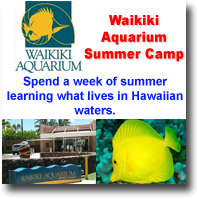
Waikiki Aquarium Summer Camp - Summer by the Sea
Spend a week of summer learning what lives in Hawaiian waters.
 Waikiki Aquarium
Waikiki Aquarium
Founded in 1904, the Waikiki Aquarium is the second oldest public aquarium in the United States. A part of the University of Hawai`i at Manoa since 1919, it is located next to a living reef on the Waikiki shoreline. More...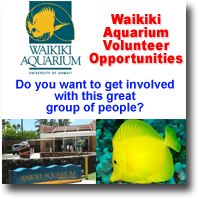
Waikiki Aquarium Volunteer Opportunities
The Waikiki Aquarium aims to "inspire and promote understanding, appreciation and conservation of Pacific marine life." Many wonderful people help to make this mission a reality.
 Waikiki, Hawaii Featured Pages
Waikiki, Hawaii Featured Pages
View our directory of feature pages showcasing all the great things Waikiki has to offer. About Waikiki - Honolulu Hawaii
About Waikiki - Honolulu Hawaii
Learn about Waikiki, Hawaii. About Waikiki Get Down.com
About Waikiki Get Down.com
Learn about WaikikiGetDown.com website and its creator. Feature Sponsors
Feature Sponsors
Great offers from our sponsors who support the Waikiki, Hawaii Community More... Waikiki, Hawaii Coupons & Discounts
Waikiki, Hawaii Coupons & Discounts
Save money in Waikiki, Hawaii with these coupons.
Terms of Use / Legal Disclaimer / Privacy Statement
Site Designed and Managed by MacBusiness Consulting

 Interview with Hawaii Public Radio Business of the Arts
Interview with Hawaii Public Radio Business of the Arts 